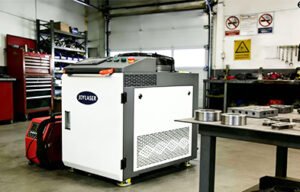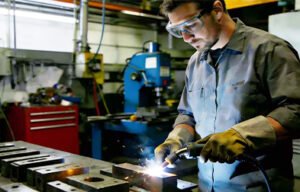Laser Welding Machines for Industrial Applications | High-Strength Welding Solutions
Introduction to Laser Welding Technology
Laser welding is an advanced welding technique that uses a focused laser beam to join materials, primarily metals and thermoplastics. This technology offers unmatched precision, deep penetration, and high-speed welding capabilities. Laser welding machines are increasingly being adopted across various industrial sectors for their superior strength, minimal heat input, and high productivity.
Why Strength Matters in Industrial Welding
In industrial applications, the strength of welded joints directly impacts product durability, safety, and performance. Weak welds can result in equipment failure, costly downtime, and potential hazards. Laser welding machines ensure strong, clean, and consistent welds, making them ideal for high-stress environments such as automotive frames, aircraft components, and structural metal parts.
Key Advantages of Laser Welding Machines
1. Superior Weld Strength
Laser welding produces deep, narrow welds with minimal porosity and excellent metallurgical bonding, resulting in high joint strength and durability.
2. High Precision and Control
Laser welding machines allow for pinpoint accuracy, making them perfect for intricate parts and small assemblies that require precision.
3. Minimal Heat Affected Zone (HAZ)
The focused energy of a laser minimizes heat dispersion, reducing the risk of material deformation and preserving the mechanical properties of the surrounding metal.
4. Clean and Aesthetic Welds
Laser welding creates smooth, clean seams that often require little or no post-processing, improving overall efficiency.
5. Fast Processing Speeds
Laser welding is much faster than traditional welding methods, significantly boosting production efficiency in industrial settings.
6. Non-contact Process
Laser welding is a non-contact technique, which reduces tool wear and maintenance costs.
Major Industrial Applications of Laser Welding
Automotive Industry
Laser welding is widely used in the automotive sector for welding car bodies, exhaust systems, battery packs, and transmission parts. The technology ensures lightweight yet durable joints, supporting the demand for fuel-efficient and electric vehicles.
Aerospace Industry
The aerospace industry demands ultra-high precision and strength. Laser welding is used for critical components like turbine blades, airframes, and fuel systems, providing reliable performance under extreme conditions.
Electronics Manufacturing
Miniaturized electronic devices require highly precise and clean welds. Laser welding is used for connecting tiny wires, sensors, and circuit boards without damaging sensitive components.
Medical Device Fabrication
Medical tools and devices such as surgical instruments, pacemakers, and implants rely on laser welding for its hygienic, non-contact process and ability to work with biocompatible metals like titanium and stainless steel.
Metal Fabrication and Sheet Metal
From industrial enclosures to heavy-duty machinery, laser welding is ideal for sheet metal processing due to its speed, consistency, and ability to weld complex geometries.
Comparison with Traditional Welding Methods
Compared to MIG, TIG, and resistance welding, laser welding offers distinct advantages:
Higher strength-to-weight ratio
Lower heat input
Better weld aesthetics
More automation-friendly
Greater precision and repeatability
While traditional welding methods still have their place, especially for thick materials and outdoor environments, laser welding has become the preferred solution for high-precision and high-volume production.
Types of Laser Welding Machines
Compared to MIG, TIG, and resistance welding, laser welding offers distinct advantages:
Higher strength-to-weight ratio
Lower heat input
Better weld aesthetics
More automation-friendly
Greater precision and repeatability
While traditional welding methods still have their place, especially for thick materials and outdoor environments, laser welding has become the preferred solution for high-precision and high-volume production.
1. Fiber Laser Welding Machines
Fiber laser welders are known for their efficiency and ability to handle reflective materials like aluminum and copper. They offer high beam quality and low maintenance.
2. CO2 Laser Welding Machines
Best suited for non-metallic materials and thicker sections, CO2 lasers offer stable performance but require more maintenance than fiber lasers.
3. Nd:YAG Laser Welding Machines
Nd:YAG lasers are ideal for applications requiring pulse welding and are commonly used in the medical and electronics industries.
4. Handheld Laser Welding Machines
These portable systems provide flexibility for on-site or large-part welding. They are easy to operate and suitable for a wide range of applications.
Choosing the Right Laser Welding Machine for Your Industry
When selecting a laser welding machine, consider the following factors:
Material type and thickness
Required welding speed and precision
Production volume
Budget and ROI expectations
Level of automation needed
Partnering with an experienced laser welding equipment manufacturer ensures you get tailored solutions that align with your industrial needs.
Future Trends in Industrial Laser Welding
When selecting a laser welding machine, consider the following factors:
Material type and thickness
Required welding speed and precision
Production volume
Budget and ROI expectations
Level of automation needed
Partnering with an experienced laser welding equipment manufacturer ensures you get tailored solutions that align with your industrial needs.
Conclusion
Laser welding machines deliver unmatched strength, precision, and speed for a wide range of industrial applications. As industries evolve toward higher efficiency and product reliability, laser welding remains at the forefront of advanced manufacturing technologies. Investing in the right laser welding equipment is not just about improving weld quality—it’s about securing long-term productivity and competitiveness in the global market.
111-1024x458.png)



